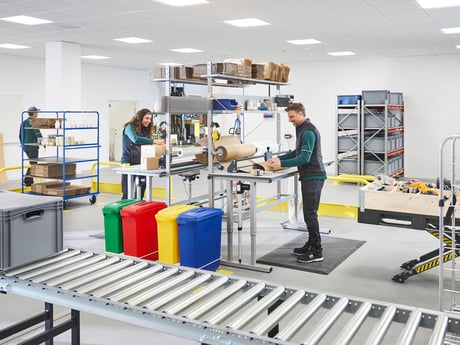- AJ Products UK
- Blog: Tips to Inspire Happiness at Work
- Improving the work environment
- Is Your Office ‘Crisis Prepared’?

Crisis-proof your workplace: Office emergency plans that work
Why office crisis preparedness matters
Protecting your business data
Having a disaster recovery plan helps offices to protect their firm’s data and other records. For example, offices can make use of fireproof filing cabinets to to protect physical files from fire, flood or theft.
Pro tip: Store essential business documents, such as insurance policies, emergency contact lists, and backup drives, in a fire-resistant cabinet in a secure location.
Don't forget the human factor
While it is important to be prepared to prevent harm to your valuable data and files, it is also important to think more about the human side of disaster.
The most important asset in any business is its people. Therefore, the most important step in any emergency situation is to track all your employees and make sure they are safe. Companies should consider using CBEC (Capture Business Emergency Contacts), which helps you download the 10 minute plan and use this template for documenting all key contacts.
8 UK Government-backed principles of emergency planning
According to UK Government guidance, it is essential to remember the 8 important principles of responding and recovering from emergencies in order for your office to be prepared.
Anticipation
It is important to anticipate all types of crisis that could occur, from cyberattacks to heatwaves. Planning ahead reduces response time and panic
Preparedness
Every employee has a role to play in handling and recovering from emergencies. It is important for offices to train their employees about their roles and responsibilities in any kind of crisis. It is important to have all rescue numbers noted down for immediate assistance.
Delegation
A decision needs to be taken at the lowest-level, with co-operation and co-ordination from the highest level management. It is important for all managers to remain calm while delegating during emergencies.
Direction
A strategic aim and supportive objectives are required to make the purpose of procedures clear. Knowing what the priorities are helps avoid confusion in high-stress situations.
Information
Protecting vital information is also critical in any sort of disaster. Companies need to make sure they store all their important files and documents together in storage cabinets, from where they can be easily recovered in case of an emergency.
Integration
It is crucial to co-ordinate within the organisation at all levels in order to sustain minimum losses in any disaster or crisis.
Co-operation
Positive engagement and information sharing is the key to ensuring effective co-operation at all levels of your company.
Continuity
It is important to continue preparing your employees to handle any situation at any given time. Update and rehearse your emergency plan regularly helps your company to be more prepared to handle any disaster with minimum losses (Gov UK, 2016 ¹).
Crisis-ready workspaces: Your physical office matters
- Clear signage for evacuation routes?
- Easy access to first aid kits and fire extinguishers?
- Soundproofed areas where staff can focus or take calls during a crisis?
Small steps that make a big difference
- Store critical documents in fireproof storage
- Keep emergency numbers visible and up to date
- Train your team in evacuation and response procedures
- Identify a crisis response team with clear roles
- Review and refresh your plan every six months
- Download CBEC’s free 10-minute emergency plan template
- Ensure open communication channels at all times



